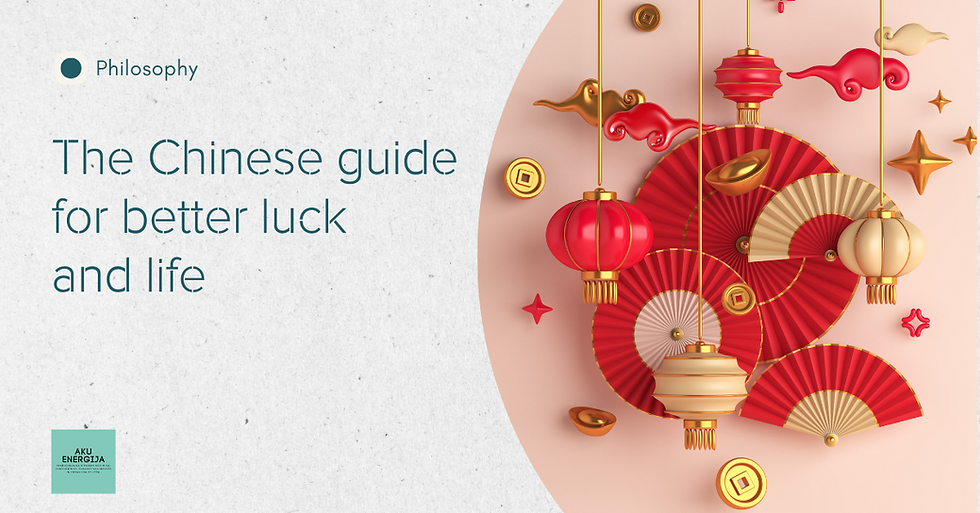Ending Suffering with Buddhism (2): The Noble Eightfold Path (½)
- Aku Energija
- Oct 25, 2024
- 3 min read
In the whirlwind of modern life, where stress and distractions often pull us in different directions, finding a sense of purpose and inner peace can feel elusive. We rush through tasks, engage in autopilot interactions, and struggle to stay grounded. What if there was a way to bring more intention and clarity to each moment? The Noble Eightfold Path provides a practical framework for achieving this balance, offering timeless wisdom that can transform the way we navigate our daily lives.

The Noble Eightfold Path is central to Buddhism, offering a practical approach to overcoming suffering and achieving inner peace. It’s not a set of rigid steps, but eight guiding principles that anyone can incorporate into daily life, regardless of religious background. By practicing these principles, we learn to live more ethically, cultivate mindfulness, and develop a wiser understanding of ourselves and the world around us.
What is the Noble Eightfold Path?
The Eightfold Path is the last of the Four Noble Truths, Buddha’s fundamental teaching. It is a set of eight interconnected practices designed to guide us toward a happier, more peaceful life by reducing our attachment to things that cause suffering. It’s also known as the Middle Way because it avoids extremes like indulgence and strict self-denial.
The path is divided into three main areas: ethics, meditation, and wisdom. These categories help us develop a well-rounded approach to life, focusing on how we act, think, and understand the world.
Ethics:
Right Action – Acting in a way that is ethical and non-harming, refraining from killing, stealing, sexual misconduct, and more. This is about aligning our actions with our values.
Right Speech – Speaking truthfully, kindly, and avoiding harmful speech. This is about using our words to build others up and create harmony.
Right Livelihood – Earning a living in a way that doesn't harm others or the environment. This is about choosing a profession that is ethical and sustainable.
Meditation:
Right Mindfulness – Paying attention to the present moment without judgment. This is about being present in our lives and cultivating awareness. [Read more: Simple mindfulness exercises]
Right Effort – Cultivating wholesome qualities and abandoning unwholesome ones. This is about putting in the effort to improve ourselves and let go of negative habits.
Right Concentration – Focusing the mind on a single object or idea. This is about training our minds to be still and clear.
Wisdom:
Right View – Understanding the Four Noble Truths (suffering exists, it has a cause, it can be overcome, and there is a path to overcome it). It's about seeing the world clearly and understanding the true nature of reality. [Read more: See things differently to manage stress and depression]
Right Intention – Cultivating thoughts of loving-kindness, compassion, and non-harming. This is about setting our intentions on what truly matters and acting from a place of kindness.
Why Should We Practice the Noble Eightfold Path?
We all face challenges in life—stress from work, tension in relationships, health problems, or just the struggle to find meaning in everyday tasks. The Noble Eightfold Path offers a framework for managing these challenges, allowing us to live more intentionally and with less emotional turbulence. When we practice these eight elements, we cultivate wisdom, compassion, and ethical conduct. These qualities, in turn, help us to live more fulfilling and meaningful lives.
Practicing this path helps you:
Reduce suffering: By understanding what causes dissatisfaction (e.g., constant desire, attachment to outcomes), you can begin to let go of habits that add to your stress and suffering. [Read more: The 7 Habits—Proven to transform lives]
Improve relationships: By practicing right speech and right action, you communicate more thoughtfully and behave more compassionately, leading to healthier, happier relationships.
Find peace in everyday life: Mindfulness and meditation teach you how to be present, reducing anxiety about the past or future and helping you enjoy the present moment.
[Read more: The Art of Daoist Quiet Sitting: A Path to Inner Harmony] [Read more: The Power of Mindful Eating: A Path to Health and Wellness]
The Noble Eightfold Path is more than just a guide for spiritual practice—it’s a way to live with greater purpose, mindfulness, and compassion. By integrating these principles into your daily life, you can reduce stress, enhance your relationships, and find a deeper sense of peace.
In the next article, we’ll dive deeper into practical, real-life examples of how you can apply these teachings, exploring how even small changes can lead to a more fulfilling and balanced life.
Reference:







Comments